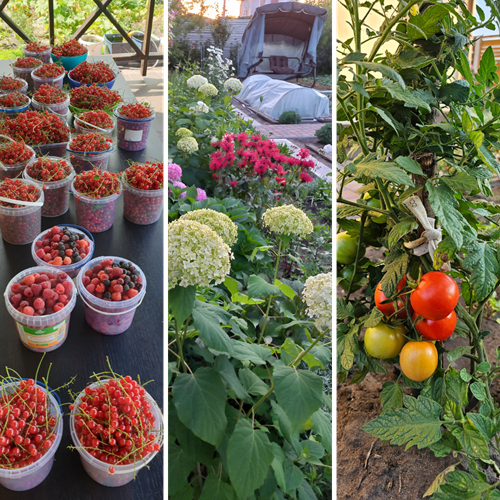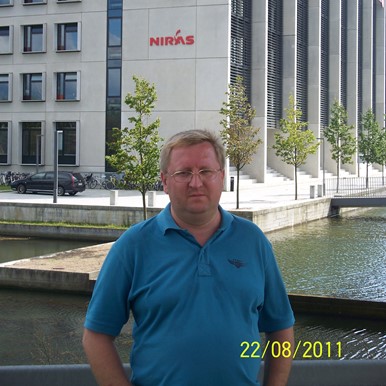Balancing the Books and Life in Wartime Ukraine

Grisha on assignment in Torit, South Sudan.
Grisha on assignment in Torit, South Sudan.
Our call began with the sound of an air raid siren blaring in the background. One year, 11 months, 2 weeks, 3 days and counting since Russia invaded Ukraine, but by now Grygoriy Fedak, NIRAS Country Director and International Finance Controller is accustomed to the noise.
“If there are explosions, I will have to stop the call,” he says casually from his desk by the window in Kyiv where he is based. “But it should be fine.” A gentle reminder to those of us who sometimes forget about the daily impact of the war still raging on Europe’s doorstep that has taken so many Ukrainian lives. But Grygoriy – or Grisha as most know him – is unperturbed and at the office where you can find him also often on the weekends.
To say Grisha is busy is an understatement. He holds two positions at NIRAS, one focused mostly on Ukraine where, as NIRAS Country Director, he is responsible for day-to-day operations and compliance, and the other as an International Finance Controller for International Consulting, where he oversees the financial activities of numerous donor-fund projects such as management of grants, audits and reporting. The 48-year-old joined NIRAS over 14 years ago after serving as a Director at Kyiv School of Economics Charitable Organisations. Prior to that, he was the Director of the Transatlantic Partners against AIDS.
Making a difference beyond the balance sheet
In his role as financial controller, Grisha is currently working with three projects: Ukraine’s Cohesion and Regional Development or UCORD project, the Markets and Seeds Access project, which is active in Zambia and Zimbabwe, and the Regional Migration Fund in Djibouti. Normally he would travel to the projects several times a year, but with martial law in place, he is not allowed to leave Ukraine.
“In the past, I travelled a lot to the field. That was actually my favourite part of the job, and I often had the chance to be part of interesting projects sometimes in challenging places. I really like that about NIRAS. The ability to work with inspiring and results-driven professionals around the world. The opportunity for development, gaining knowledge, and learning about new cultures and people,” Grisha says.
One of his favourite projects was in South Sudan where he visited the Water for Eastern Equatoria project site in Torit on several occasions. He also recalled the great experience with the Media and Democratisation Programme in the Eastern Partnership countries and Turkey where he was part of efforts to improve financial literacy and went to different cities to conduct training among partners. Grisha knows first hand how these “small” efforts can contribute to the bigger picture. Today in western Ukraine, many of the farmers who were supported with and flourished as a result of matching grants given as part of a Danida-funded Agro-Based Value Chain project (AgroLviv) he supported in his first months at NIRAS have been critical to maintaining food security across the nation during war. Grisha fondly recalls conducting financial training for female agropreneurs (AgroLadies training) as part the project to increase productivity and profitability in the agricultural and processing sector in his birthplace of Lviv. “You go there and they remember NIRAS,” he explains. “We made a difference, and today we can see the impact.”
Part of the larger NIRAS family
Grisha’s wife often worried about him travelling to fragile states and now the irony is he cannot leave his own country at war. When Russia invaded on 24 February 2022, Grisha and his family fled to the Bucha region escaping Kyiv. They left for Lviv, where he grew up, only one day before the Russians invaded the now-infamous area. He was overwhelmed by messages of support from colleagues and used funds gathered from NIRAS staff in Sweden and Denmark to provide food and other items to refugees who had been displaced to Lviv. Offered several places to stay abroad where he could bring his family, Grisha declined them all. “I was so touched by these proposals and the many, many colleagues who reached out to me. But that was not the way for me. We needed to stay here. But it was comforting to know NIRAS will never leave its staff in any problem,” he explains.
But in fairness NIRAS needs Grisha equally as much if not more. The quip among staff is if you have him on your project, a 50% success rate is already guaranteed. But, joking aside, he is held in great esteem by many as a reliable pair of hands, hardworking and thorough. “He knows every trick in the book on how people report so you cannot get anything past him. No one has an eye for money like he does,” Jane Bech Larsen NIRAS Business Development Director laughs. “He has a wonderful family, who have suffered from a senseless war, and he still keeps going to the office. Grisha is the most humble person I have met.”
As a person who works with Grisha on a regular basis, NIRAS International Consulting Financial Controller Gitte Kettner recalls the first time she met him. “I was doing a financial control of our Danida project in Lviv, and it was such a great experience to meet someone who handles all the issues. He had an answer for every question, reaching for binders where everything was meticulously recorded. I was in heaven,” she says with a laugh. Fourteen years later, Gitte is still in heaven with such a dependable colleague by her side. “When we have a challenging issue, I say ‘OK, we need to send in Grisha’. He can solve anything. You can always count on him, he’s so loyal. But he is more than a colleague. I consider him my friend.”
A realistic optimist
Grisha has been back in Kyiv since March 2022. His workload is heavy because it is difficult to find financial professionals in Ukraine so he has to take on tasks that would normally fall to others. To relax, he spends time in his garden with his wife where they plant flowers and grow fruits and vegetables for their own consumption. After a sleepless night due to air raid sirens or missiles falling nearby, Grisha retreats to the garden. “You have to enjoy at least something, create rest and relaxation for yourself. Our garden is that place. In the winter, we go for walks with our dog and I like to cook and use the smoke barbeque. I try to be an example for my family.”
But it has not been easy. His young nephew recently died on the battlefield and his body cannot be retrieved due to the Russian occupation, and a cousin’s son lost his leg. The day-to-day stress of living in war has definitely taken its toll, but Grisha goes to the office every day.
“The doctors go to the hospitals. Someone needs to bake the bread and someone needs to provide the milk. We have to keep going, keep the economy moving and pay our taxes to support the soldiers. Work is not easy of course. We are working extra hard, but it is nothing compared to what the people in the east are suffering. You have to take something positive from what you do. You are working a lot, but you are with your family. You can put an apple on the table and some might think it’s bruised or inedible, but you can just cut a small part off and it’s very tasty,” he says simply.
Grisha is an optimist at heart but a realistic one. “I know there are things I cannot change. 1+1 will always equal 2. When it comes to finance, you have to make sure things are done properly and often you work hard in the beginning to make it easier at the end. It is like with this war. We are far away from the recovery of Ukraine. The east and south of the country are still under huge attacks, and every day someone is injured or killed. But this war will end and when it does a lot of support will be needed to rebuild.”
And as if to emphasise his point, the air siren sounded again indicating no threat of missiles anymore as the Russian planes had left Ukraine’s airspace.
In the meantime, Grisha works, ever the optimist, preparing the groundwork for a time when other staff will join him to support the numerous projects he sees just over the horizon in Ukraine’s future.
 Grisha's garden
Grisha's garden
Learn more about NIRAS' work in Ukraine here.
Read this story in Ukrainian.



